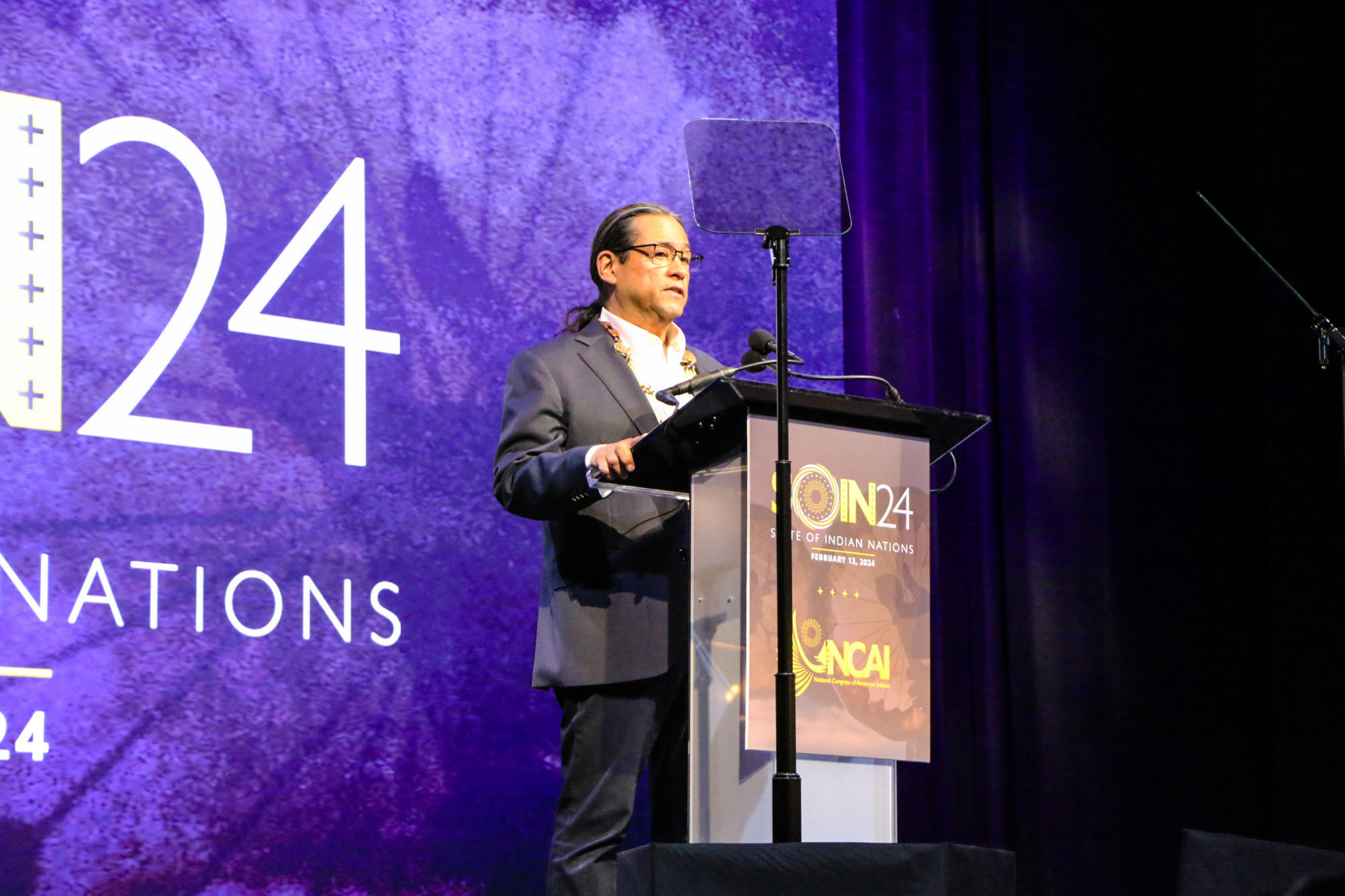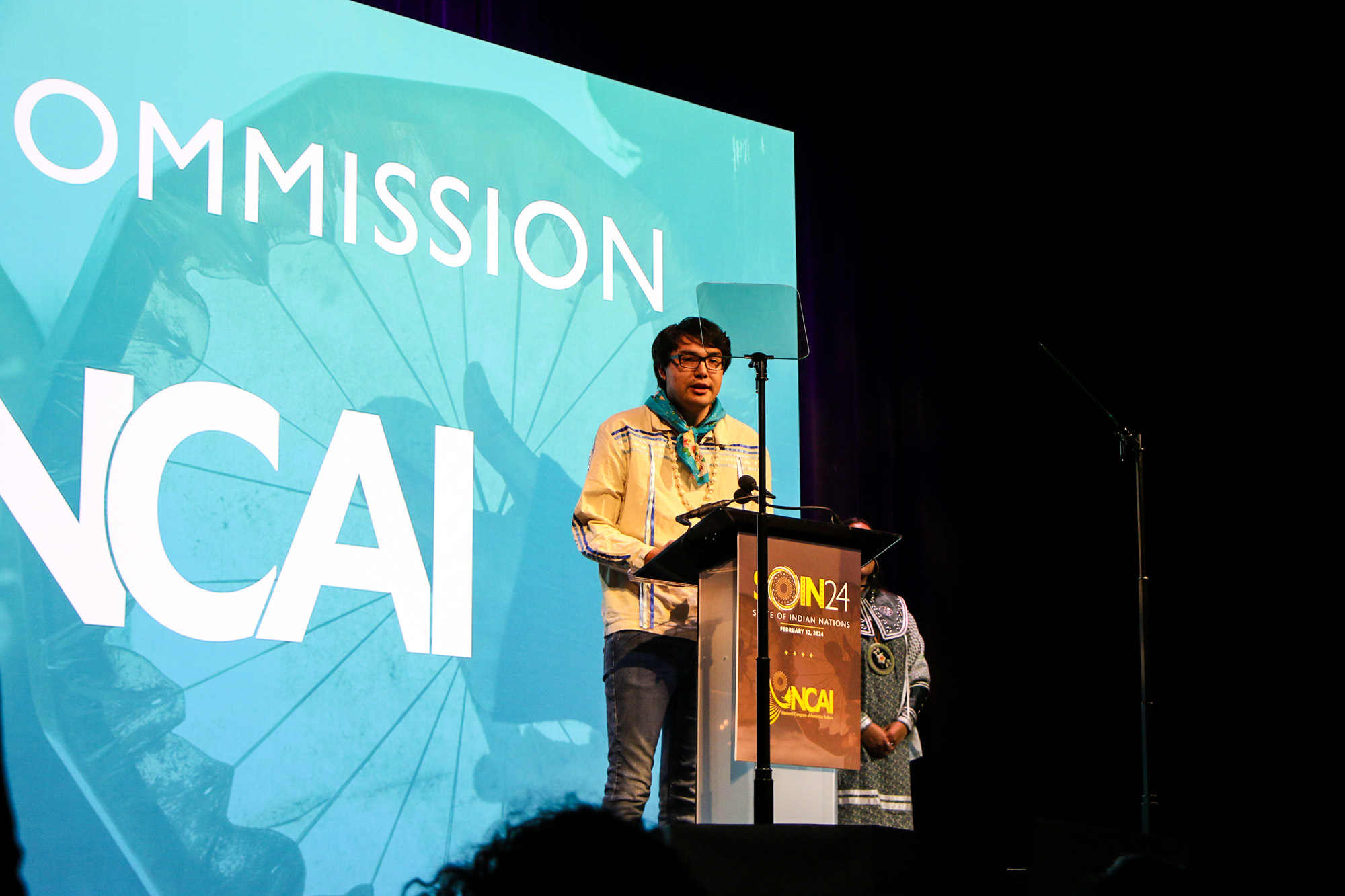Indianz.Com > News > Cronkite News: National Congress of American Indians lays out policy agenda
State of Indian Nations is good, but could be better, speakers say
Tuesday, February 13, 2024
Cronkite News
WASHINGTON, D.C. — Tribal nations are seeing themselves represented more than ever before in the government, but they still need to make their voices heard more loudly at the ballot box, the president of the National Congress of American Indians said Monday.
NCAI President Mark Macarro’s comments came as part of the annual State of Indian Nations address, that included comments from tribal youth and congressional response from Rep. Mary Peltola, D-Alaska.
Macarro, making his first such address as president, called for more stable health care funding and improved resources for tribal police – but he repeatedly turned to the need for ballot access, mentioning the issue multiple times during a nearly 30-minute address.
He cited the proposed Native American Voting Rights Act, calling it “not just a bill that needs congressional approval, but a tool that empowers our political voice and the Native vote. Macarro pushed Congress for quick action, as he believes Native voters could play a pivotal role in this fall’s elections. “In 2024, the power of the Native vote has the potential to swing elections and shape history, not just for Native people, but for everyone in the United States,” Macarro said. The Native American Voting Rights Act, introduced in 2021, would have made polling locations more accessible to Native voters, expanded early in-person voting and created a Native American voting task force that would focus on increasing voter outreach and registration. But the bills died after failing to receive hearings in either the House or Senate.ICYMI: Listen to the State of Indian Nations, hosted by the National Congress of American Indians in Washington DC. #NCAI #SOIN2024 #DC @NCAI1944 https://t.co/UiHWfAtcT9
— indianz.com (@indianz) February 12, 2024


Macarro, however, took time to praise the Biden administration, saying he had set a “powerful precedent” of collaboration. He specifically mentioned an increase in Native representation in the federal government, led by Interior Secretary Deb Haaland, a member of the Pueblo of Laguna and the first Native American to serve as a Cabinet secretary. “Under this presidency there are more Native Americans in the highest levels of government than ever before,” Macarro said. “This representation fosters a deeper understanding of our needs. Substantial efforts have been made to enhance government to government dialogue.” Despite this, Macarro also called on the administration to push for more and better resources for Native law enforcement, saying “we see over-policing in our urban Indian communities and we see under-policing in our reservation lands.” “Indian Country occupies 56 million acres of land with a combined force of 3,000 officers,” he said. “A reservation of 1 or 2 million acres is being patrolled by one or two officers. To contrast, the U.S. Capitol complex here in D.C. is 270 acres with more than 2,000 officers.” Macarro believes that ultimately tribal requests should be met, arguing that most of them are a product of previous errors by state and federal governments. “Indian Country’s needs are not entitlements. Indian Country’s needs are nonnegotiable, they are imperative and they must be met,” Macarro said. For more stories from Cronkite News, visit cronkitenews.azpbs.org.National Congress of American Indians President Mark Macarro highlights 3 major issues in Indian Country:
— indianz.com (@indianz) February 12, 2024
* Public safety and justice, including over-policing of urban Indians & under-policing on reservations
* Unity among tribes
* Native vote & voting rights#SOIN2024 @NCAI1944 pic.twitter.com/IG2DEIi2aH
Note: This story originally appeared on Cronkite News. It is published via a Creative Commons license. Cronkite News is produced by the Walter Cronkite School of Journalism and Mass Communication at Arizona State University.
Search
Filed Under
Tags
More Headlines
Native America Calling: New post office rule is among potential hurdles for Native voters
Native America Calling: Remembering Ben Nighthorse Campbell and Harvey Pratt
President Trump vetoes tribal homelands bill with swipe at trust relationship
Native America Calling: The Pleiades star cluster ushers in winter story season
NAFOA: 5 Things You Need to Know This Week (January 5, 2026)
Native America Calling: Native in the Spotlight with Elaine Miles
Native America Calling: Gearing yourself up for 2026
Statement: Chairman of Miccosukee Tribe on veto of homelands bill
Native America Calling: Lumbee Nation secures its sovereign status
Chuck Hoskin: Cherokee Nation builds on tradition with technology
Native America Calling: The Year in Native News
Native America Calling: Native music in 2025
Native America Calling: Amid Greenland’s independence push, Denmark accounts for colonial blunders
Senate Committee on Indian Affairs sets business meeting and hearing
Native America Calling: Saving historic architecture and other important places
More Headlines
Native America Calling: Remembering Ben Nighthorse Campbell and Harvey Pratt
President Trump vetoes tribal homelands bill with swipe at trust relationship
Native America Calling: The Pleiades star cluster ushers in winter story season
NAFOA: 5 Things You Need to Know This Week (January 5, 2026)
Native America Calling: Native in the Spotlight with Elaine Miles
Native America Calling: Gearing yourself up for 2026
Statement: Chairman of Miccosukee Tribe on veto of homelands bill
Native America Calling: Lumbee Nation secures its sovereign status
Chuck Hoskin: Cherokee Nation builds on tradition with technology
Native America Calling: The Year in Native News
Native America Calling: Native music in 2025
Native America Calling: Amid Greenland’s independence push, Denmark accounts for colonial blunders
Senate Committee on Indian Affairs sets business meeting and hearing
Native America Calling: Saving historic architecture and other important places
More Headlines